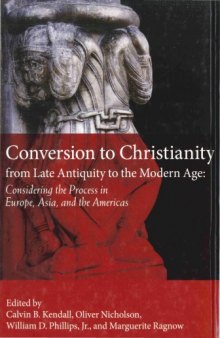 جزییات کتاب
جزییات کتاب
This debut volume in the new series Minnesota Studies in Early Modern History brings a comparative approach to what, in recent years, has been a hotly debated topic within and across a number of academic disciplines: conversion to Christianity. These debates register the challenges inherent in attempting to understand a transformation that was at once personal and collective - a matter of inner conviction and outward conformity. The essays in this volume range from the late antique Middle East to medieval Western and Eastern Europe; from early modern Asia to the Americas and islands in the Central Pacific. Collectively, the ten authors encourage consideration of the conversion phenomenon comparatively across time and space. Felipe Fernandez-Armesto, Prince of Asturias Professor the History at Tufts University, frames the essays in a broader global perspective in light of the two other major world religions, Islam and Buddhism, in his Prologue, while John M. Headley, Distinguished University Professor, University of North Carolina, considers the various conversion processes and their broader impact within the cultural transformation of the societies involved, foreshadowing "the uncertain extension of the universal jurisdiction of humanity ... to the peoples of the globe" that is one of the transformative processes of the 21st century. The Center for Early Modern History (CEMH), established nearly a quarter-century ago at the University of Minnesota, is a major center for the study of the early modern world (ca. 1350-1800) from a comparative perspective. This period is of vital interest to scholars in a variety of disciplines and it is the essential background to understanding global interactions in the modern world. Minnesota Studies in Early Modern History is a natural outgrowth of CEMH's mission to encourage interaction and collaboration among and within the scholarly community and to disseminate the results of that collaboration to the wider audience beyond academe.



 دانلود کتاب
دانلود کتاب

 جزییات کتاب
جزییات کتاب





 این کتاب رو مطالعه کردید؟ نظر شما چیست؟
این کتاب رو مطالعه کردید؟ نظر شما چیست؟
